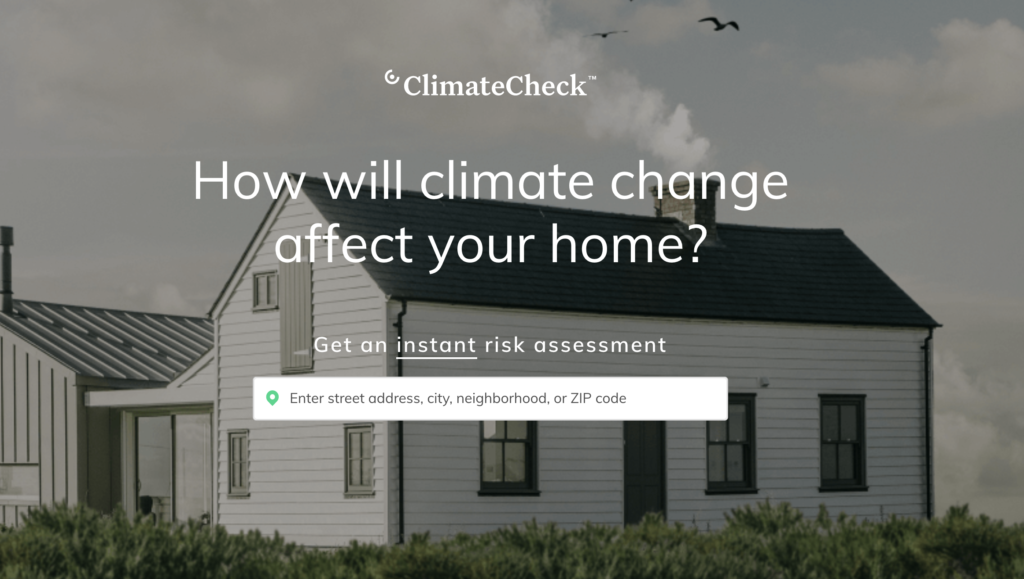ClimateCheck Tells the Story of How Much
In 1960s Berkeley, our home didn’t have central air conditioning and it didn’t matter. We never needed it. In fact, when temperatures hit a rare 80 degrees, it was big news and time to wear shorts. These days in Berkeley and the rest of the Bay Area, a home without AC is an uncomfortable home. Last June, Berkeley temperatures reached 107 in record-setting heat.
News-making temperatures are one of the many ways in which climate change is impacting the real estate industry. The risk of fires, storms, drought, or flooding can make a buyer reconsider what would have been the perfect home. While disclosure forms and flood insurance help, they don’t tell the full story of the impact of climate change over the 30 year horizon of the typical home loan.
What IS climate change—in everyday language?
Climate change is defined as a change in global or regional climate patterns, in particular a change apparent from the mid to late 20th century onwards and attributed largely to the increased levels of atmospheric carbon dioxide produced by the use of fossil fuels. (Oxford Languages)
Simply put, the stuff we burn to make life more comfortable for us, (electricity, heating, transportation), is ultimately resulting in changing weather patterns, temperature, and water levels.
According to the National Aeronautics and Space Administration, (NASA), global temperatures are continuing to rise, and most of the warming occurred in the past 40 years, with the six warmest years on record taking place since 2014.
Climate Change Risk Assessment for Homes
Livability is a thing. It is the sum of factors that add up to a community’s quality of life—including the built and natural environments. Real estate professionals know more the most the importance of quality of life in buying or selling homes. A new tool is designed to assess risks associated with climate change called ClimateCheck. ClimateCheck has made climate change tangible. The tool evaluates and rates homes for risk of climate change-related hazards compared to other homes in the United States. The ClimateCheck roster is an impressive team that includes expertise in real estate design and development; data and environmental science, and technology. Their tool rates homes based on two factors: Future Risk, and How Much Risk Will Change Over Time.
ClimateCheck CEO and real estate developer Cal Inman says ClimateCheck is consumer-driven much like the consumer desire for valuations that was met by Zillow with the Zestimate. Inman says, “Actually, 74% of people are aware that climate change is happening. Real estate agents can be the client’s source or point them to a third party for this information.”
Inman is a lecturer at UC Berkeley. It was there that he connected with leading researchers and learned that their data is used on Wall Street by investors. “Our tool empowers consumers with that same information that has only been available to professionals in the past.”
The ClimateCheck tool is leading-edge technology that is already on the radar of real estate portals and large, tech-forward MLSs. It is proving to be another consumer-centric technology that advances the practice of real estate.
By simply entering an address on their website, a full ClimateCheck assessment report is generated using a 0-100-point scale, and emailed within minutes. The report quantifies risk in the areas of temperature, fire, floods, storms, and drought.
The story of climate change is like the cumulative poem of The House that Jack Built, where random people and items become related because they all are somehow connected to the house that Jack built. Climate change is also cumulative: agriculture and food supply; random animal and insect migration and viruses; and weather patterns that increase the number of hurricanes and storms we experience.
Climate change is more than a catch phrase to promote environmental policy, it is a measurable shift in our environment taking place where we live. Now there is a tool that tells how much that change is impacting what we call home.
We stand at a crossroads in real estate once again. In many ways, climate change is akin to agent ratings or AVMs – two significant points of information that the industry sidelined only to have them come back as leading features of companies who seek to disintermediate real estate professionals.
Our industry can ignore climate change and continue the greenwashing efforts that have done nothing. Or, we can take a leadership role. Leadership implies leading, an industry stepping up to make a meaningful contribution to consumers by deploying innovative new solutions like ClimateCheck or others.
We happen to think that ClimateCheck is very well executed and on their way to delivering the service as a point solution that can be integrated into an MLS system, broker/franchise back office solution, or as a website widget. These are the types of things that leaders and innovators need to be considering to remain relevant experts. For more information on this product visit https://climatecheck.com/.
Do you want to lead next year? Make climate change your company’s mission.





“Actually, 74% of people are aware that climate change is happening.” This is the funniest statement of all time! Of course the climate is changing, it has since the first days of Earth. Ever heard of Ice Age? Only human beings with their arrogant mindset can think we are actually controlling the climate. Just one simple mans opinion, not motivated by $$$.
Totally get your point. Not everyone connects the dots to real estate and other verticals. You’re not “simple” by any means. 🙂
Thank you for reading!